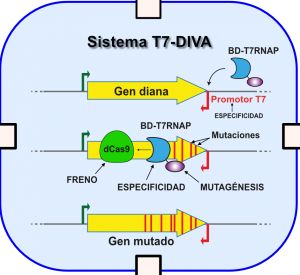Beatriz Álvarez, investigadora del CNB explica las ventajas del nuevo sistema al que han llamado T7-DIVA (T7-targeted dCas9-limited in vivo mutagenesis), “este sistema incluye varias modificaciones en la célula, por un lado, la secuencia del promotor T7 al final del gen que nos interesa mutar, que actuará como “etiqueta” y una proteína de fusión que contiene una enzima con capacidad de producir mutaciones unida a una polimerasa que reconoce el promotor T7”. Su combinación con una versión inactiva de la endonucleasa Cas9 del sistema CRISPR-Cas9 permite en primer lugar generar mutaciones en la zona específica, así como acotar y delimitar de forma eficiente el segmento de ADN a evolucionar”.
Este tipo de herramientas que permiten la mutagénesis in vivo tiene un gran potencial en biotecnología, como por ejemplo en el desarrollo de variedades sintéticas de anticuerpos y enzimas, proteínas relacionadas con la resistencia a antibióticos y para mejorar la biosíntesis de compuestos de interés mediante la evolución de rutas biosintéticas.
Mutagénesis in vivo y evolución molecular
La aparición de mutaciones que generan diversidad y la selección de las variantes mejor adaptadas al ambiente es la base de la evolución. Esta también puede ocurrir a nivel de proteína, lo que se denomina evolución molecular. Para acelerar este proceso natural, extremadamente lento, se han desarrollado técnicas de evolución molecular dirigida en el laboratorio que permiten generar variantes de proteínas con interés biotecnológico o biomédico de manera mucho más eficaz. Los primeros ensayos en la evolución dirigida se realizaban in vitro, y para la selección posterior, las variantes del gen se insertaban en células que las pudieran expresar, como la bacteria Escherichia coli o levaduras. En los últimos años las investigaciones se están dirigiendo al desarrollo de técnicas de evolución molecular in vivo que permitan la mutación, expresión y selección de las variedades de proteínas de manera directa en las células de interés, acelerando la obtención de variantes de una forma rápida, continua y con escasa manipulación. Así se podrían identificar y caracterizar de manera eficaz nuevas proteínas con interés biotecnológico e industrial.
Más información
In vivo diversification of target genomic sites using processive base deaminase fusions blocked by dCas9. B Álvarez, M Mencía, V de Lorenzo, LA Fernández. Nature Comms 22 Dec 2020 https://doi.org/10.1038/s41467-020-20230-z






